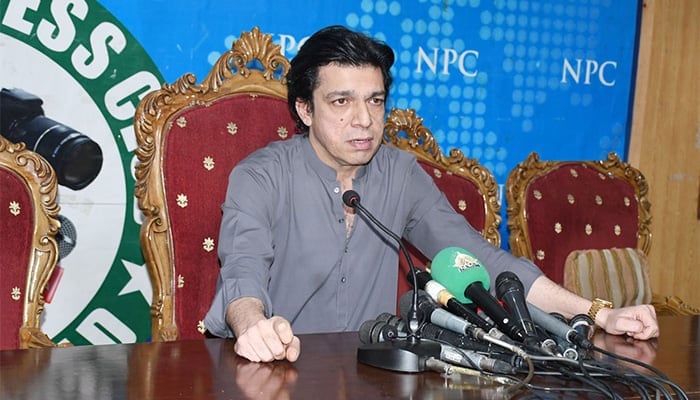SC 'takes suo motu notice' of Faisal Vawda’s hard-hitting presser against IHC judges
CJP Qazi Faez Isa-led bench will hear the matter today, according to sources
ISLAMABAD: A day after an independent Senator Faisal Vawda came down hard on Islamabad High Court (IHC) judges, the Supreme Court on Thursday took suo motu notice of his hard-hitting presser, sources told Geo News.
Vawda on Wednesday blasted the IHC judges over their letter alleging meddling by spy agencies in judicial affairs, saying that targeting of institutions should stop.
“Stop targeting the institutions, enough is enough. If there is any interference by institutions, then provide evidence and we will stand together [against it],” the former Pakistan Tehreek-e-Insaf leader had said during the presser.
Vawda, while speaking about the accusations by the IHC judges, reiterated that the names of agencies was being mentioned again and again. "Give evidence and we will stand beside you," he added.
"Put a ban on social media. Do it for the whole Pakistan and not for your yourself. Make laws for social media but make them for everyone," said the senator.
The sources privy to the development said a bench led by Chief Justice of Pakistan (CJP) Qazi Faez Isa will hear the suo motu notice today (Friday).
Justice Irfan Sadaat and Justice Naeem Akhtar Afghan are also part of the bench, they added.
Vawda's news conference came after he had filed a request in the IHC registrar calling for disclosure of the correspondence between then-IHC chief justice Athar Minallah and IHC's Justice Babar Sattar about the latter's green card.
The senator's letter referred to the social media campaign against Justice Sattar accusing him of holding a US nationality and having a business interest in a private school in the country.
In response to the smear campaign, the IHC’s public relations officer in the statement had said: “Justice Babar Sattar has never had any nationality other than that of Pakistan. He studied law at Oxford University as a Rhodes Scholar and pursued graduate education at Harvard Law School. He worked as a lawyer with a law firm in New York and while living and working in the US, was issued the Permanent Resident Card (also called green card) after being regarded as a person of extraordinary ability. He left his job in the US in 2005 and returned to Pakistan and has lived and worked in Pakistan since then.
The apex court's suo moto came hours after the IHC responded to the Senator Vawda's letter saying: "The information sought by the high court from lawyers being considered for elevation/appointment as judge does not include information regarding residency and/or citizenship of any country other than Pakistan."
The IHC registrar wrote the letter to Vawda, on behalf of IHC Chief Justice Aamer Farooq, maintaining that such residency/citizenship is not a disqualification for a judge under the country's Constitution.
-
Security forces gun down 30 terrorists in multiple IBOs in KP: ISPR
-
MQM-P calls for new province in Sindh
-
US report validates Pakistan military edge over India: PM
-
Banned TTP poses serious threat to Pakistan security: UNSC panel
-
CM Afridi clarifies remarks on by-poll after ECP requests army deployment
-
Dubai sees 3.2m Pakistani passengers in 2025 as airport sets new milestone
-
Security forces kill 23 Indian proxy terrorists in KP's Kurram
-
Pakistan to construct island to boost oil exploration: report












